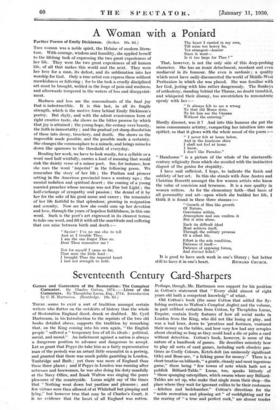A Woman with a Poniard
Further Poems of Emily Dickinson. (Seeker. 10s. 6d.)
Tins woman was a noble spirit, the Heloise of modern litera- ture. With courage, wisdom and humility, she applied herself
to the lifelong task of expressing the two great experiences of her life. They were the two great experiences of all human life, of all that makes this world and the next. They were her love for a man, its defeat, and its sublimation into her worship for God. Only a true artist can express these without mawkishness or faltering ; for to the task a cruelly disciplined art must be brought, welded in the forge of pain and madness, and afterwards tempered in the waters of loss and disappoint- ment.
Madness and loss are the concomitants of the final joy that is indestructible. It is this last, in all its fragile strength, which is the motive force behind Emily Dickinson's poetry. But shyly, and with the adroit evasiveness born of right creative taste, she shows us the bitter process by which that joy is attained ; the young hope, the ecstasy over beauty, the faith in immortality ; and the gradual yet sharp dissolution of these into decay, treachery, and death. She shows us the impossible made possible, and the possible made a certainty.
She changes the commonplace to a miracle, and brings miracles down like sparrows to the threshold of everyday.
Reading her work, we have to look warily, for a syllable or a word used half wistfully, carries a load of meaning that would sink the dainty verse of a minor poet. See, for instance, how she uses the word ' imperial ' in the following poem. We remember the story of her life ; the Puritan and pioneer setting in the American provincial town a century ago ; the mental isolation and spiritual desert ; the coming of a young married preacher whose message was not Fire but Light ; the half-exchange of sympathy and passion ; the denial of it by her for the sake of his good name and career ; the remainder of her life faithful to that splendour, growing in resignation and serenity. Now see how she could sum up her devotion and love, through the years of hopeless faithfulness, in this one word. Such is the poet's art expressed in its clearest terms: to take one word, and fill it with all the sanctitude and suffering that can arise between birth and death :-
" Savior ! I've no one else to toll And so I trouble Thee, I am the one forgot Thee so. Dost Thou remember me ?
Not for myself I came so far, That were the little load— I brought Thee the imperial heart I had not strength to hold. The heart I carried in my own, Till mine too heavy be, Yet strangest—heavier
Since it went=
Is it too large for Thee ? "
That, however, is not the only side of this deep-probing character. She has an ironic detachment, mordant and even mediaeval in its humour. She even is sardonic ; a quality which must have sadly disconcerted the world of Middle-West Puritanism in which she was placed. She was familiar with her God, jesting with him rather dangerously. .The flunkey-a of orthodoxy, standing behind the Throne, no doubt trembled, and whispered their dismay, too awestricken to remonstrate openly with her :— " It always felt to me a wrong To that old Moses done, To let him see the Canaan
Without the entering." •
Hardly discreet, was it ? And into this humour she put the same consummate artistry, compacting her intuition into one epithet, so that it glows with the whole mood of the poem :—
" I never felt at home below, And in the handsome skies
I shall not feel at home I know, I don't like Paradise."
" Handsome " is a picture of the whole of the nineteenth- century religiosity from which she recoiled with the instinctive disgust of the genius for stupidity.
I have said sufficient, I hope, to indicate the finish and subtlety of her art. In this she stands with Jane Austen and Christina Rossetti amongst the few women artists who know the value of concision and terseness. It is a rare quality in women writers. As for the elementary faith—that basis of all personality and art—upon which she builded her life, I think it is found in these three stanzas :-
"Growth of Man like growth Of Nature,
Gravitates within, Atmosphere and sun confirm it But it stirs alone.
Each its difficult ideal
Must achieve itself,
Through the solitary prowess Of a silent life.
Effort is the sole condition, Patience of itself—
Patience of opposing forces, And distinct belief."
It is good to have such work in one's library ; but better






































 Previous page
Previous page